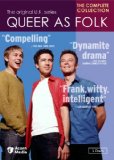| Reviews & Columns |
|
Reviews DVD TV on DVD Blu-ray 4K UHD International DVDs In Theaters Reviews by Studio Video Games Features Collector Series DVDs Easter Egg Database Interviews DVD Talk Radio Feature Articles Columns Anime Talk DVD Savant Horror DVDs The M.O.D. Squad Art House HD Talk Silent DVD
|
DVD Talk Forum |
|
|
| Resources |
|
DVD Price Search Customer Service #'s RCE Info Links |
|
Columns
|
|
|
Queer As Folk: The Complete U.K. Collection
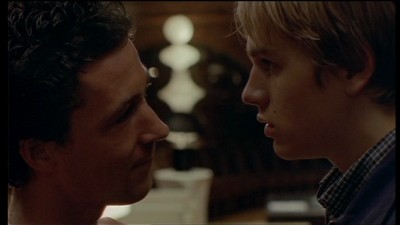
If nothing else, revisiting the original U.K. version of Queer as Folk (which ran from 1999-2000 and caused a mini-sensation when it reached these shores a decade ago, inspiring Showtime to produce their flashier, much longer-running American remake) is a reminder of how unfairly loaded is the idea of "representation" in fictional works, most especially when it comes to representing minorities, whether racial, religious, or sexual. (It is the latter in this case, of course.) What Queer as Folk should have been, were the world a bit more just and civilized and a bit less uptight and confused, was just another silly, suggestive, sometimes downright risqué nighttime soap opera whose characters happened to be leading frivolous, impossibly overdramatic and glamorized gay lives instead of the equally overheated, promiscuous, vacuous existences to be witnessed on straight-centered equivalents like Dynasty or Melrose Place. What it was forced to be under the circumstances, however, is something that not even a much better program could realistically have been; as the one fully-publicized, widely-viewed TV show that finally placed gays at the center of their very own lives rather than reducing us to figures of fun or disgust (or both) on the shady, exotic periphery of "normal" life, Queer as Folk, despite its unabashed aesthetic commitment to equal-opportunity trashiness, was bound to be saddled with the unasked-for obligation of presenting some important truths about the unexamined lives of a long-oppressed and still poorly understood Other. That is one thing this entertaining, cheesy wisp of fluff unequivocally fails to do. The question is, why would a show that could be so described have anything of significance to contribute to an important, non-showbiz-related social and political discussion, and isn't anyone's expecting or needing it to do so reflective of a gap in the discourse that goes way beyond anything television could address?
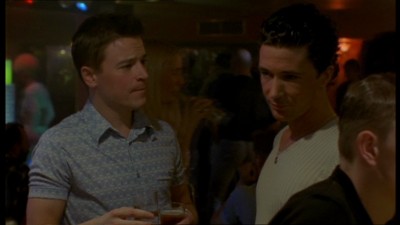
A thumbnail of Queer as Folk's frothy, sudsy plot would go something like this: Nathan (Charlie Hunnam, Undeclared), a suburban, high-school-attending gay teenager, makes his tentative way down to Canal Street--Manchester, England's designated gay district--looking for a world where he can be himself and freely explore his identity. Nathan may be insecure and intimidated, but young male hormones recognize no sexual orientation, and he ends his night "successfully" with being picked up by Stuart (Aidan Gillen, The Wire), a man twice his age who is a yuppie by day, voracious cruiser by night. Vince (Craig Kelly, Titanic), Stuart's best friend/brother figure since age 14, is his underconfident, supermarket-managing opposite number in many respects, but he has been secretly but obviously in love with his friend for the duration of their relationship, but when he is exposed to the intense heat between Stuart, his object of romantic longing, and Stuart's latest conquest, who will play a role of significance in their lives unanticipated by any of them, it transforms the ongoing, unrequited-love-based passive-aggression between Stuart and Vince into the central love triangle that makes Queer as Folk's multitude of shocking plot twists and meandering, twisty-turny storylines go.
Those storylines include (but are by no means limited to): Stuart's having fathered for his lesbian friend Romey (Esther Hall) a child whose birth coincides with the night he is first with Nathan; the defiantly gay Stuart's incomprehensibly having stayed in the closet when it comes to his parents; Vince's closetedness at work leading to an awkward crush on the part of a female coworker; the eternal meddling and camaraderie of Vince's mother, Hazel (Denise Black), a permanent fixture on the gay scene who enjoys camp and disco as much, if not more so, than her gay son; the death by accidental OD of a member of Stuart and Vince's clubbing circle; the run-of-the-mill homophobia of Nathan's father and the extreme, horrific, disowning variety endured by Stuart and Vince's flamboyant friend Alexander (Antony Cotton); Nathan's inevitable high-school trials and tribulations, ameliorated by his tight bond with best friend Donna (Carla Henry), and so on and so on. If it is juiciness and turnover you seek, Queer as Folk's breathless pace of accumulating event is desperate not to disappoint.
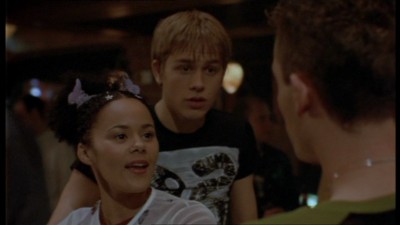
All of it is completely fantastical and, as these Brit characters would say, a load of bollocks; and it could not have less to do with most people's real life, gay or straight. If the show does often touch with intelligent perceptiveness on certain commonplace, recognizable attitudes and experiences, it is exclusively to reflect them in its TV-bound fun-house mirror in aid of furthering all the whipped-up, forever onrushing drama. And as often as not, the relevant issues raised are resolved in much the same superficially satisfying, only-in-fiction manner in which Thelma and Louise dealt with their sexist-trucker problem; things are actually blown up and smashed, and if that stretches the limits of suspended disbelief even on Ridley Scott's silver screen, it is just outrageously over the top in a low-budget BBC production. But why shouldn't it be just fun, ridiculous, tawdry, occasionally softcore-sexy drivel? (Needless to say, Queer as Folk is certainly not for those still shocked by the ins and outs of same-sex sex; but then, neither is 21st-century life for grown-ups in the Western world.) The idea that anyone would watch Queer as Folk and have a lightbulb switch on over their head, saying to themselves, "Oh, now I understand; that's how those people are!" is appalling, but no more so than it would be if I were to consider Desperate Housewives representative of the typical suburban heterosexual lifestyle, so it would seem unfair to hold the program's congenial, well-intentioned creators responsible for transforming any ignorance or intolerance on the audience's part.
So, to set aside its failure to represent anything but a ghettoized, fabulous, stereotypical, "lifestyle" version of gay people's lives and judge it exclusively on its success as what it means to be, Queer as Folk is not half bad. It is not all that good, either; its freneticism, broadness, and bluntness is frequently cringe-inducing by any reasonable standard, and its relentlessly repeated theme music, which seems intended as saucy and cheeky but which sounds like monkeys whooping over a Muzak-like faux-tropical melody, is cued so often to the show's moments of triumph and ostensible big punchlines that it ends up being as annoying, obnoxious, and dreaded as a laugh track. Still, for better or worse and when all is said and done, Queer as Folk is no more and no less than a few hours' mildly amusing, fairly diverting, completely harmless fun.
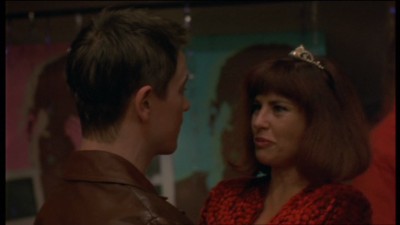
THE DVD:
There are no visual flaws to speak of. The visual style of the series--its 35 mm lighting and processing--is standard low-budget TV, which means the look is overall even but somewhat dull, though there are some extraordinary moments at the level of camera movement and shot construction. The show's visual dimension is merely serviceable, not especially ugly or beautiful, but it is well-preserved on this transfer.
Sound:The Dolby Digital 2.0 stereo soundtrack is solid, as well, completely clear and with some surprising fullness and depth. As with the visuals, there is nothing breathtaking here, but a good job is done in bringing the sound elements as they are to your home theater in the best, most intact way possible. There are no flaws in the sound other than a slightly muffled, perhaps almost imperceptibly distorting quality to the dialogue that is probably due to the limitations of the original sound recording.
Extras:The extras are centered around the team that created the show--writer Russell T. Davies and producer Nicola Shindler--and I have to say that these two are at least as fun and entertaining, and twice as smart, as any of the show's characters. Their interviews recounting their memories of preparing and shooting Queer as Folk are the highlight of the 45-minute documentary/featurette "What the Folk...?, which also includes many interviews with principal cast members and some snippets documenting the debate and controversy that swirled around the program upon its initial transmission in the U.K. And the only reason on earth that anyone would watch the many minutes of deleted and extended scenes included on this DVD is to hear Davies and Shindler's quite refreshingly sharp, honest, self-critical commentary on why the scenes were cut or deleted; they have a funny and/or technically interesting story related to this or that day of shooting that is triggered in their memory by viewing the scenes, and they play off each other like a comedy team.
Longer clips from several commentary and interview U.K. television programs are fascinating and revealing in that they document a surprisingly vigorous debate within the U.K.'s gay community about the show. Especially interesting is a panel program in which Davies and Shindler appear for an articulate, non-heated but lively debate alongside a moderator, a young gay man, and a lesbian representative from the U.K.'s Stonewall gay-rights group, the latter two expressing some very harsh criticisms of what they see as Queer as Folk reductivism and disservice to the gay community. It is to the credit of Acorn media, who produced this DVD edition, that their supplements are far removed from any sycophancy, and actually give us a chance to consider the legitimate criticisms and concerns the show raised among the very people it was supposed to be celebrating.
The disc also includes on-screen-text biographies of the principal actors and a 20-page booklet containing a long but funny, charming, and page-turning essay by Davies in which he offers his thoughts and memories around the show. This piece of writing actually demonstrates a level of considered thoughtfulness, insight, and self-effacement that one would frankly not expect from the creator of Queer as Folk.
FINAL THOUGHTS:Queer as Folk is definitely more valuable as a sort of cultural place-marker than it is on its own merits as filmed TV entertainment. Aside from its "shocking" content, the shock value of which seems quaint post-Brokeback Mountain and Modern Family, it is really nothing but a late-90s evening soap, and like most of its kind, it does not stand a chance, impressiveness-wise, in an era where Curb Your Enthusiasm, Mad Men, In Treatment, etc., etc. have raised the highest standards of television sky-high. It is, however, fun enough if you can take its inbuilt corniness, as well as a cultural document of some significance if you can consider it in context (which this DVD edition has all the trappings to allow the viewer to do.) It will likely work best if you Rent It, contemplate and take what you can from (re)witnessing its specific, odd-in-retrospect moment in the evolving intersection of LGBT civil rights/visibility and mainstream cultural preoccupations (a moment for which it serves, usefully enough, as symptom, symbol, and signpost), and then turn your attention to something more deeply affecting and thought-provoking (might I suggest Boys Don't Cry?) as you let Queer as Folk evaporate back into the blurry ether of disposable pop culture to which it rightfully belongs.
|
| Popular Reviews |
| Sponsored Links |
|
|
| Sponsored Links |
|
|
| Release List | Reviews | Shop | Newsletter | Forum | DVD Giveaways | Blu-Ray | Advertise |
|
Copyright 2024 DVDTalk.com All Rights Reserved. Legal Info, Privacy Policy, Terms of Use,
Manage Preferences,
Your Privacy Choices | |||||||









